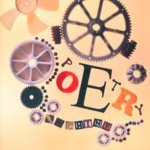 If you know me at all, you know I’m not quite rational about poetry. Of course, poetry isn’t a rational subject. And writers of it tend to not be, either. How could we be? It’s all about stories and metaphor and images and following a silvery thread through the labyrinth of the human heart… How’s that for an image?
If you know me at all, you know I’m not quite rational about poetry. Of course, poetry isn’t a rational subject. And writers of it tend to not be, either. How could we be? It’s all about stories and metaphor and images and following a silvery thread through the labyrinth of the human heart… How’s that for an image?
Really, though, it’s more like the picture. It’s gears in your head, and a kind of writing machine that’s powered by your blood and thought and experience and who knows what else? Not (in other words) rational…
But the practice of poetry has changed my life. These days, when I find myself eaten up with anger at the injustices visited upon so many Americans — and even more world citizens — I try to write it out. Or read it out. And when I’m missing my long-gone father, or my mother, or friends half-way across the country? I focus my attention on poetry.
It’s a kind of tonglen, I guess. Certainly I try to practice poetry that way, turning my own anger or grief or sorrow (even my joys) into a form of practice. Don’t get me wrong: I don’t mean that the zombie tanka I submitted last night to a journal (really) is Buddhist practice. But the concentration on the moment, the attempt to observe (even imaginatively!)…? These are components of practice. They keep me in the moment, and move me away from attachment. Well, except for the whole ‘get-it-right’ thing…
That’s the beauty of practice, though, as I’ve said here, here, and here. You’re always beginning, and it’s always a fresh start. There’s not even a word for ‘guilt’ in Tibetan, a lama once told me in a session. Lama Chokyi, a translator for several monks as well as of several Buddhist texts, said that when he tried to explain the concept of guilt to the monk for whom he was translating, the monk’s eyes widened and he exclaimed: Why would you DO that??
I agree. Why do we do that?
So I am deeply smitten w/ writing as practice. The Japanese have a lovely way of putting it: they add dó as a suffix to a martial art (or the tea ceremony) to mean that the sport (or practice) has become an art, a discipline and a way into practice:
In Japanese … culture the suffix ‘do’ transforms a sport into an art and indicates that some philosophy and correct moral discipline is intrinsic to it. For the Japanese do is an experiential term in the sense that the practice (the way of life) validates the discipline cultivated through a given art form. The ‘art’ in this case is martial art; though now we should remember that traditionally and at the conception of Japanese martial art this included poetry, painting, calligraphy and flower arranging to name but a few.(Dó – the Japanese Way)
While I don’t know the old Japanese term for the practice of poetry as a ‘way,’ I know it’s what I do. And not simply poetry, but all my writing. Because whenever we discipline ourselves to pay attention — to almost anything, as the Japanese knew — and work to perfect that attention, we are practicing.
Even in a lowly blog ~

